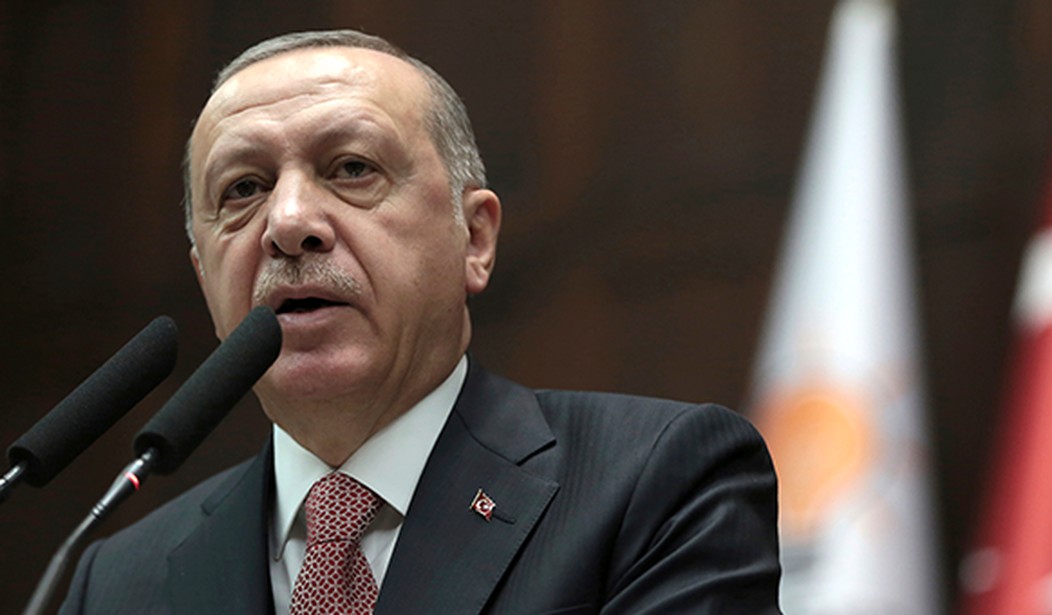Is American economic power an anti-missile defense weapon?
In the case of Turkey's imminent -- and destructive -- acquisition of Russian S-400 surface-to-air-missiles (SAMs), the answer is yes, at least for the moment.
That seems to be the Trump administration's conclusion.
If NATO member Turkey concludes the Russian missile deal, it will suddenly confront economic growth-crimping American sanctions.
Ankara, Turkey, and Washington are already trading diplomatic rebukes.
"Networking" is a relevant word. NATO is a political network sustained by a commitment to mutual defense. Operationally, NATO aircraft fly within an air control network and air defense network. These, and other communication networks, scan and share more than air traffic data. They can share targeting data, intelligence, friendly locations and destinations.
The F-35 is touted as a "networking" weapon. In stealth mode, it can detect targets and relay the information to non-stealthy U.S. and allied aircraft. F-35s can network with ground- and sea-based weapons. In fall of 2018, U.S. Marines discovered the sensors on their F-35B vertical takeoff jets can locate ground targets, by day and night and in all weather. The Marines now link F-35Bs with the M142 High Mobility Artillery Rocket System (HIMARS). HIMARS is an Army-developed weapon and is essentially a digitally connected truck that fires long-range, precision-guided rockets. Marine HIMARS can shoot from the decks of several types of amphibious ships. See the scenario? The F-35B is a forward observer for 21st-century naval gunfire. A Marine F-35B sending target information via encrypted burst transmission can remain undetected.
Recommended
But maybe not.
The Russian S-400 missile is also a network, with radars and electronic support equipment, as well as missiles. According to some sources, Russia will provide Turkey with training support, which means Russian technicians would get a long, intimate look at NATO's command and control communications technology.
If integrated into NATO's air defense network, the S-400 system could do more than disrupt NATO air defense. It could act as a digital spy and give Moscow a window to tap other digital communications and sensor networks. An S-400 with an embedded chip the Turks fail to find and remove could relay to Moscow in real time the location of every NATO aircraft, Turkish F-35s included.
Outlandish? Perhaps. But the risk is real.
Why does Turkey take the risk?
The bottom-line answer is because of its president, Recep Tayyip Erdogan. Erdogan's status as a moderate Islamist is up for debate, but his status as an absolute egomaniac hell-bent on replacing Mustafa Kemal Ataturk as Turkey's greatest political leader is all but proven. Since the curious coup of July 2016 -- which Erdogan blames on a former Islamist ally exiled in the U.S. -- Sultan Recep (Ergodan's derisive nickname) has systematically jailed journalists, repressed political opponents and purged government workers. He has either arrested or cashiered many Turkish Air Force officers that he's damaged its operational effectiveness.
In the process of securing his personal power, he has all but ruined the Turkish democracy created by Ataturk. I suspect that is Erdogan's deep goal. Jealousy twists minds, destroys souls and, in Erdogan's case, damages modern Turkey and may well cripple NATO.
Erdogan's strategic political damage to NATO and the S-400's potential tactical and operational damage (as sketched above) explain U.S. Army Gen. Curtis Scaparrotti's testimony before the Senate Armed Services Committee.
"My best military advice would be that we don't then follow through with the F-35," Scaparrotti, the Supreme Allied Commander Europe, said. He told the Senate that flying the F-35 with an ally using an advanced Russian air defense system is a terrible idea.
On March 4, the Office of the U.S. Trade Representative said America would end Turkey's preferential trade treatment that has been in place since 1975. The reasons given were diplospeak about Turkish economic modernization. The real reasons are the political and military incompatibility of simultaneously fielding American F-35s and Russian S-400s.























Join the conversation as a VIP Member